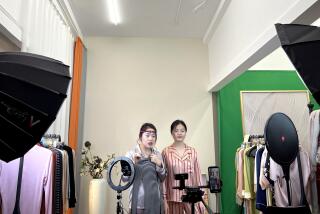Scandal hits home for Chinese
- Share via
BEIJING — Even after regulators assured the public that all contaminated baby formula was off the shelves, B.X. Wei wasn’t going to feed his 2-month-old son anything that came out of a can. Especially not one made in China.
But his wife didn’t have enough breast milk for the baby.
Then the 30-year-old businessman from Jiangsu province remembered that during his childhood, women would nurse each other’s babies if one ran out of milk. So he decided to try a new twist on the old tradition: On Monday, he put an ad on the Internet soliciting a wet nurse.
“I don’t know if any milk powder is safe,” Wei said.
China’s latest food scandal has created a surge of interest in wet nurses. Wei has been interviewing candidates who are asking for as much as $1,500 a month -- about 10 times the average price of a nanny.
Parents who can’t afford such luxuries are in a quandary. As stores here and elsewhere in the world remove such products as yogurt and candies amid the scandal over contaminated milk, Chinese consumers are left wondering what else might be poisoning their children.
The discovery that melamine, a toxic industrial compound, had been added to Chinese milk has set off a panic extending through Asia, Europe and parts of Africa. (No tainted products have been discovered to date in the U.S.)
In Japan, cookies, buns, candies and cheese containing traces of the chemical have been recalled, some of them by venerable Japanese food companies that had purchased dairy products from China. In Hong Kong, U.S. manufacturer H.J. Heinz Co. pulled baby cereal from shelves, saying it had found minute traces of melamine.
In Taiwan, Pizza Hut said Friday that it had found tainted cheese and was removing it from restaurants. As a precaution, Starbucks outlets in China now offer only soy milk in drinks.
One of China’s most beloved sweets, White Rabbit candy, which looks a bit like saltwater taffy, is being recalled worldwide because it has traces of tainted milk.
World Health Organization officials said Friday that China needed to develop its consumer protection system so that regulatory agencies communicated with one another and didn’t attempt to sweep problems under the rug.
“You need a culture of openness and quick reporting,” said Jorgen Schlundt, director of WHO’s department of food safety, speaking to reporters in Beijing.
Hans Troedsson, the U.N. organization’s China representative, said that the national government had responded quickly but that locally there was a “combination of ignorance and deliberate failure to report . . . that put people’s lives at risk.”
Melamine, used in making plastics, is sometimes added to watered-down milk to make it appear to have a higher protein content. In high concentrations, it can cause kidney stones, especially in babies. Four Chinese children have died and more than 54,000 have fallen ill because of baby formula that contained melamine-contaminated milk powder.
WHO officials warned that there could be more deaths, though probably not in large numbers because kidney stones, if treated, are rarely fatal.
Previously, many here had shrugged off complaints about Chinese-made products as China-bashing or hysteria by spoiled Western consumers. But the baby milk crisis has hit home in a way that other scandals did not. Some people even acknowledged (with embarrassment since it goes against their sense of patriotism) that they are going out of their way to look for products not made in China.
“The inspection of foreign products is stricter. The regulations are better,” said Qiao Ningxia, a 30-year-old Beijing resident who breast-fed her son for a year before switching to imported formula. “Our laws are not properly developed. If you pay, you can get away with things.” Like many Chinese, Qiao despairs that her country’s new-found wealth has not made people healthier.
“When I was young, we didn’t have as much food, but everything we ate was organic. The children were healthier then,” said Qiao, pointing to her son, now 3, who was wearing a white mask over his mouth because of a chronic cough. The mother and son were visiting the Capital Institute of Pediatrics, where other parents had brought their babies to be tested for kidney problems.
Baby formula is relatively new to China. Mothers like it as a way to show prosperity and to have fat babies, a traditional sign of health.
Ivy Makelin, who advises Chinese mothers on breast-feeding through La Leche League International, said formula manufacturers had been aggressively pushing women to bottle-feed, getting maternity hospitals and doctors to help them with marketing.
“You have a lot of white-collar moms now who are concerned about their figures and their looks and don’t want to breast-feed, and women who are just too busy in business,” said Zhang Fengchang, who works for a nanny agency in Wenzhou.
Her agency started providing wet nurses in 2006, and now it’s scrambling to find more who meet their criteria.
“The woman must be healthy. They do physicals for sexually transmitted disease and HIV. The woman must have given birth within six months,” said Zhang.
Wet nursing is an old tradition in China. Chinese Emperor Puyi nursed into his teens. Under the Communists, wet nursing was banned as decadent, but it has come back into fashion for the wealthy in recent years.
There should soon be cheaper options as well for women who don’t want to breast-feed or use formula. Nongovernmental organizations are trying to set up milk banks where nursing mothers with extra milk can donate it.
Meanwhile, some parents have come up with another scheme to provide fresh, clean milk to their children: They are renting cows.
--
Nicole Liu of The Times’ Beijing Bureau contributed to this report.
More to Read
Sign up for Essential California
The most important California stories and recommendations in your inbox every morning.
You may occasionally receive promotional content from the Los Angeles Times.













